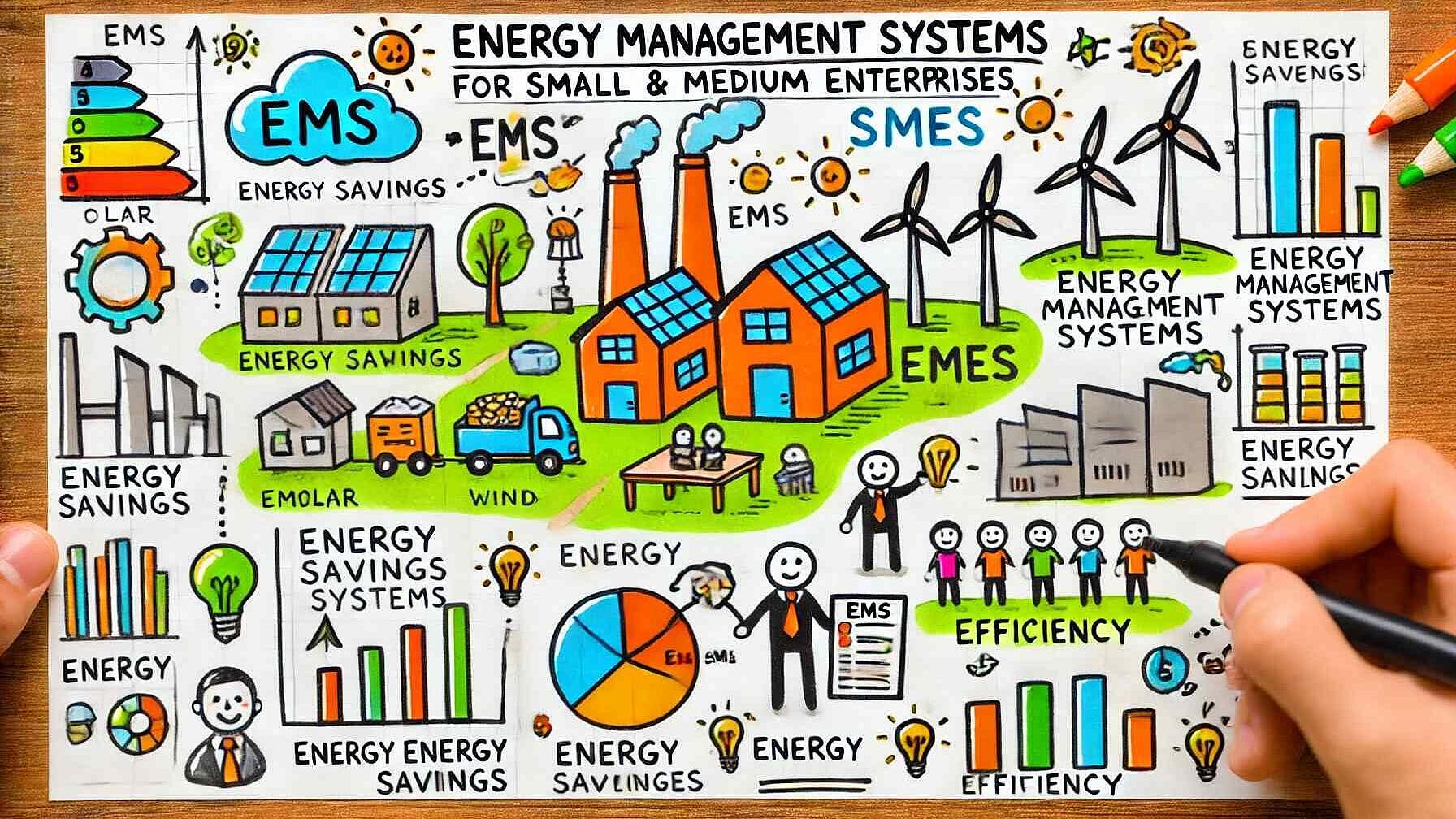 Energy Efficiency
Energy EfficiencyEnergy Efficiency Reloaded: How European SMEs Are Driving Sustainability and Savings
Summary
The paper discusses the significant role of small and medium-sized enterprises (SMEs) in Europe's energy consumption, highlighting their collective responsibility for about 13% of the total demand. Although SMEs face challenges in implementing energy efficiency, such as lack of resources, knowledge, and time, there are still substantial opportunities to save energy and reduce emissions. As Europe aims for a 32.5% improvement in energy efficiency by 2030, the participation of SMEs is crucial.
The research identifies barriers to energy efficiency unique to sectors and countries within Europe but also points out key success factors, including awareness of benefits, access to energy audits, development of energy strategies, dedicated energy managers, and supply chain collaborations. Innovative approaches, like "one-stop-solution" models, are proving effective in overcoming multiple barriers. Additionally, government policies and support mechanisms are vital for incentivizing SMEs to pursue energy-efficient measures.
The paper concludes with recommendations for SMEs to prioritize energy management and for policymakers to enhance communication and develop tailored programs. Embracing energy efficiency is poised to not only contribute to Europe's climate goals but also to improve the competitive edge and sustainability of SMEs across the continent.
Open full article
Energy Efficiency Reloaded: How European SMEs Are Driving Sustainability and Savings
The Power of Small Businesses in Europe's Energy Landscape
Small and medium-sized enterprises (SMEs) are the backbone of Europe's economy, accounting for 98.9% of all businesses. While individually their energy consumption may seem modest, collectively they are responsible for approximately 13% of Europe's total energy demand. This significant footprint presents both a challenge and an opportunity in the quest for improved energy efficiency across the continent.
Recent studies have shown that SMEs have substantial potential to save energy and reduce carbon emissions. Even small improvements at the individual level can lead to significant savings when scaled across the EU. As Europe strives to achieve its ambitious target of 32.5% improvement in energy efficiency by 2030, the role of SMEs in this journey cannot be overstated.
Breaking Down Barriers to Energy Efficiency
Despite the potential for savings, many SMEs face significant hurdles in implementing energy efficiency measures. A comprehensive analysis of seven European projects revealed common barriers across different countries and sectors:
1. Lack of financial resources
2. Limited awareness and knowledge about energy efficiency
3. Insufficient time and personnel to focus on energy management
4. Skepticism about the benefits of energy efficiency investments
5. Absence of energy audits and management systems
Interestingly, these barriers are not uniform across all SMEs. For instance, automotive sector SMEs in Germany, France, Spain, and Italy tend to prioritize short-term, low-risk energy efficiency measures such as lighting and compressed air systems upgrades. Meanwhile, SMEs in Slovenia and Italy often focus primarily on production activities, showing less interest in energy efficiency compared to other countries.
Driving Change: Key Factors for Success
The research highlighted several drivers that can promote energy efficiency adoption among SMEs:
1. Awareness of economic and non-economic benefits
2. Access to free energy audits and grants (as seen in Ireland)
3. Development of energy strategies and policies
4. Appointment of dedicated energy managers
5. Collaboration within supply chains (particularly effective in the food and beverage sector)
One promising approach is the "one-stop-solution" model, which provides SMEs with comprehensive support including information, advice, capacity building, energy auditing, implementation assistance, and financing guidance. This holistic approach can help overcome multiple barriers simultaneously.
The Role of Policy and Support Mechanisms
Government policies and support mechanisms play a crucial role in encouraging SMEs to adopt energy efficiency measures. The study found that:
- Energy audit obligations vary across EU countries, with some requiring audits only for large enterprises or energy-intensive SMEs.
- Many SMEs are unaware of available government support schemes and financial incentives.
- National authorities can enhance the impact of energy audits through targeted schemes and programs.
There's a clear need for better communication and promotion of existing support mechanisms. Additionally, policymakers should consider developing tailored approaches that account for differences in business size, sector, location, and data availability.
Innovative Approaches and Best Practices
Several innovative approaches have emerged from the European projects studied:
- Self-financing mechanisms: Accumulating savings from no-cost measures to fund more expensive upgrades.
- Supply chain synergies: Encouraging collaboration between companies in the same supply chain to achieve greater overall efficiency.
- Customized training programs: Tailoring capacity building to specific roles and sectors within SMEs.
- Energy efficiency networks: Facilitating knowledge sharing and best practices among SMEs.
- Integration of energy efficiency into broader sustainability strategies.
These approaches demonstrate that with creativity and commitment, SMEs can overcome barriers and capitalize on energy efficiency opportunities.
The Road Ahead: Recommendations for SMEs and Policymakers
Based on the findings, several recommendations emerge for both SMEs and policymakers:
For SMEs:
- Prioritize energy management by appointing dedicated personnel or outsourcing to experts.
- Develop comprehensive energy strategies aligned with business goals.
- Take advantage of available support mechanisms and financial incentives.
- Invest in employee training and awareness programs.
- Collaborate with supply chain partners to maximize efficiency gains.
For Policymakers:
- Enhance communication and promotion of existing support schemes.
- Develop more targeted and sector-specific energy efficiency programs.
- Facilitate easier access to financing for energy efficiency projects.
- Encourage the adoption of energy management systems in SMEs.
- Support the development of energy efficiency networks and knowledge-sharing platforms.
By implementing these recommendations, Europe can accelerate progress towards its energy efficiency goals while helping SMEs become more competitive and sustainable.
Conclusion: A Brighter, More Efficient Future for European SMEs
The journey towards improved energy efficiency in European SMEs is complex but filled with potential. By addressing barriers, leveraging drivers, and implementing innovative approaches, small businesses can play a pivotal role in Europe's energy transition. As awareness grows and support mechanisms improve, we can expect to see more SMEs embracing energy efficiency not just as a cost-saving measure, but as a core component of their business strategy and competitive advantage.
The collective impact of these efforts will be substantial, contributing significantly to Europe's climate goals while fostering a more resilient and sustainable SME sector. As we move forward, continued research, policy refinement, and knowledge sharing will be crucial in unlocking the full potential of energy efficiency in SMEs across Europe.
If you want to know more, read the full report here.
This is article and the underlying reports provides the answers to the EENOVA quiz from EnerWhizz
- 5 questions in 45 seconds
- win prizes
- TOP50 win
The EENOVA quiz is part of the EU project EENOVA - more here



